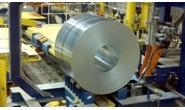Market Segment

March 6, 2018
NLMK Execs Call Tariffs on Slabs Unfair
Written by John Packard
NLMK USA told Steel Market Update this afternoon that if the 25 percent tariff on steel, and specifically on steel slabs, goes into effect, the future of their company and the people who work for it is in jeopardy long term.
Steel Market Update spoke with Bob Miller, President of NLMK USA and Executive Vice President James Banker, Jr. Not only does a tariff on semi-finished steel threaten NLMK, it threatens the market with a shortage, as 15 percent of flat rolled sheet steel is produced from converted slabs. “Prices are going to go up and up. There is going to be a shortage of steel,” said the two executives.
Not every mill in the United States is being treated equally when it comes to the Section 232 tariffs proposed by President Trump. The “haves,” or those mills that are going to be winners should the 25 percent tariff become a reality, are the integrated mills (U.S. Steel, AK Steel, ArcelorMittal USA) and the minimills that use scrap and pig iron as their primary source of raw materials (Nucor, Steel Dynamics, Big River Steel and North Star BlueScope).
The “have nots” are those mills that do not produce their own steel in either an EAF or blast furnace/BOF. They include California Steel Industries, USS/POSCO, SteelScape, Ternium in Louisiana, CSN in Terre Haute, Ind., Wheeling-Nisshin, AMNS Calvert, Evraz Oregon, JSW Texas, Acero Junction and NLMK USA.
These “have nots” will be impacted much differently by the 25 percent tariff than companies that do make their own steel. It’s not just the companies that buy slabs which will be hurt. Conversion mills will have to pay up for their domestic substrate (if they are able to get it) at a time when the costs for the steel-producing mills are barely rising.
NLMK said the mills that make their own steel can still import iron ore from Canada, pig iron from Russia or Brazil, DRI from Trinidad or Venezuela and scrap from Europe without having to pay any duties on these steelmaking inputs. “It’s not fair to have those raw materials receive exclusions from this tax,” Miller told SMU. Tariffs on slabs may place a burden on NLMK and its customers that they are unable to bear, he added.
Miller and Banker said the good workers in Western Pennsylvania have a lot to lose should the president decide to tax foreign slabs. “We have American workers in American plants processing foreign slabs,” Miller said. “Our jobs in Western Pennsylvania are just as important as jobs anywhere else. I am sure California Steel feels the same about their jobs and their workers.”
He also spoke about the jobs and the money spent to build the Port of Paulsboro in New Jersey where NLMK USA is the largest tenant. The jobs of longshoremen, teamsters, railroad workers and support staff that back up the movement of slabs from the port to the mill are all threatened, Miller said. “These are all good paying jobs with good benefits. It makes no sense.”
NLMK USA and its 1,200 U.S.-based employees provide 2.8 million tons of hot rolled, cold rolled and galvanized steel products to U.S. customers. Of the 2.8 million tons, 2.0 million of them are produced from foreign slabs.
The company operates two rolling mills: one in Portage, Ind., which has an electric arc furnace but is not able to produce all of the product the hot strip mill can roll, and one in Farrell, Pa., which rolls HRC, CRC and GI coils from slab that comes from NLMK’s parent company in Russia, as well as a smaller amount of material out of Brazil.
In 2011, NLMK USA had an arrangement with U.S. Steel to provide slabs. We were told that USS did not give them all the slabs they needed. Since then, USS has divested Stelco in Canada and closed its furnace in Fairfield. “The playing field has changed,” Banker said. Asked if NLMK has spoken with the producing mills to see if material would be made available, Banker said, “Today, there are no slabs available.”
NLMK advised SMU that they have approximately 60 days of slabs on the floor, which are applied to working orders. There are vessels on the water, but they are unsure if customers are going to be willing and able to pay the 25 percent tax on their products.
“As our order book fills, we will very quickly be at a point to know if we will be able to make any margin. If we have to add 25 percent to our costs, it’s questionable if we will be able to make money. Our parent company won’t let us sell if we can’t make money,” Banker said.
Another innocent loser in this scenario will be the community of Farrell, Pa., where the NLMK plant delivers 20 percent of the city’s tax revenues. It’s already in a depressed status under the state of Pennsylvania’s Act 47.
Miller and Banker, both supporters of President Trump’s efforts to help the steel industry, believe a more focused approach on countries cheat the system and on products that are dumped into the United States would make more sense and save American jobs.







